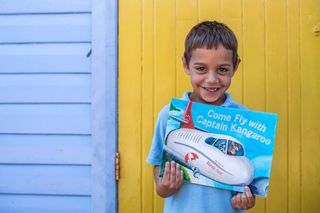Early Language and Literacy

Program overview
The Early Language & Literacy (EL&L) Program equips educators, parents and community members with the knowledge and tools required to work with their own children to develop foundational language and literacy skills.
At the heart of the program is a vision to create systemic change by empowering communities to be their own change-makers.
The program works with urban, regional and remote communities that experience common challenges including health and developmental issues, trans-generational illiteracy and disengagement from education. These factors impact upon a child’s ability to learn and engage with education.
Proven to work
A five-year independent study by the Australian Council for Educational Research (ACER) of EL&L’s impact on children’s early language and literacy growth has confirmed that the program closes the oral language and early literacy gap in the year before school for children in marginalised communities.
What is the EL&L Program?
The EL&L Program combines principles from speech pathology and education in accessible skills, knowledge and practical multi-sensory resources to support oral language, phonological/ phonemic awareness, pre-writing, pre-phonics, comprehension and the integration of these into daily activities.
The program’s whole-of-community approach strengthens the ability of educators and community members to teach their own children fundamental literacy skills, while increasing the skillsets, capabilities and engagement of participating adults.
Adults in the community are provided with the requisite teaching tools, resources and strategies to positively impact children’s school readiness, engagement and attendance. The EL&L strategies are presented as ready to be integrated into daily activities with children at home and in community settings.
At the heart of the program is the nationally accredited 11027NAT Certificate IV in Early Language and Literacy training course (delivered by ALNF through Ninti Training Limited (NTL), RTO 70018) which combines speech and language pathology and early years education best practice to:
- Extend children’s oral language and early literacy growth and confidence.
- Increase the knowledge and skillsets of community members, parents and local educators with oral language and early literacy strategies drawn from speech pathology and education.
- Increase access to books and literacy resources within the community, including multisensory, engaging resources for use in daily life – at play and in learning environments.
In recent years, the EL&L Program has been augmented with the Early Language and Literacy Developmental Index, which provides educators with immediate and reliable feedback about children’s learning needs over the seven key subdomains of early language and literacy development, so that they can ensure that the learning opportunities that they provide are giving those children the best opportunity. EL&L practitioners receive recommendations on children’s learning needs, which they can easily respond to with EL&L strategies to meet children where they are at.
The program is offered in both English and Indigenous First Languages to support Two Ways education with Aboriginal or Torres Strait Islander Languages. Resources available in both digital and physical formats. The use of First Language with young children contributes to strong literacy growth in English, and aligns with international best practice in building strong oral language skills in the early years as a precursor for strong literacy and language development in the later years.
"In over 25 years of teaching, I have found [the Early Language and Literacy Program] one of the most practical and beneficial experiences both for student and teacher learning."
Classroom Teacher
Mid-North Coast NSW
Why it matters
The project’s purpose aligns with international and domestic evidence on the science of reading, which confirms that strong pre-phonics and early language/vocabulary skills are vital precursors for success in reading development and educational engagement.
Similar research identifies that a disparity exists upon school entry in the early language and literacy experiences between children raised in higher socioeconomic conditions and those in lower socioeconomic conditions.
We aim to close this gap, so all children are able to commence school ready to learn, regardless of socioeconomic status.
Expression of interest
If you would like more information about the Early Language & Literacy program, please contact us using the form below.